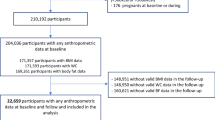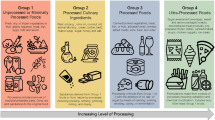Summary
Data from a representative health and nutrition survey of German adults (sample of 1073 women and 806 men) were used to investigate the relationship between coffee consumption and the concentration of cholesterol in serum as well as other lipoprotein constituents. For these outcome variables multivariate analyses were conducted separately for men and women. Differences in age, body mass index, smoking habits, use of oral contraceptives, physical activity, alcohol, fish, fat, milk and tea consumption were controlled for in the models. Interactions between coffee drinking behavior and smoking habits as well as between coffee and the use of oral contraceptives in their relationship with serum cholesterol were of special interest in the analyses. Higher coffee intake (>400 ml/d) showed higher total cholesterol, LDL cholesterol and lower triglyceride rich lipoprotein (TRL) and triglyceride concentrations in serum compared to lower intake (<200 ml/d). Smoking appeared to be an aggravating factor in these relationships. Results of the linear regression analysis demonstrated an increase of 1.66 mg/dL LDL-C per cup of coffee daily consumed for men and of 1.58 mg/dL for women. The combination of high coffee intake, smoking and no oral contraceptive use ever was associated with the highest total and LDL-C and lowest TRL concentrations in this population. The observed differences may be explained by an increase of lipoprotein lipase activity due to coffee consumption.
Zusammenfassung
Unter Verwendung von Daten einer repräsentativen Gesundheits- und Ernährungsstudie über deutsche Erwachsene (1073 Frauen und 806 Männer) wurde der Zusammenhang von Kaffeekonsum und Serum-Cholesterinkonzentration und anderen Lipoproteinfraktionen geprüft. In multivariaten Modellanalysen, für Männer und Frauen getrennt durchgeführt, war für Alter, Body Mass Index, Rauchen, Gebrauch oraler Kontrazeptiva, sportliche Aktivität, Alkohol-, Fisch-, Fett-, Milch-und Teekonsum geprüft worden. Spezielles Interesse galt dem Einfluß von Rauchgewohnheiten sowie der Gebrauch oraler Kontrazeptiva auf die Beziehung zwischen Kaffeekonsum und den Serum-Lipidkonzentrationen. Im Vergleich zu geringer war höhere Kaffeezufuhr (>400 ml/Tag) mit höheren Gesamt- und LDL-Cholesterin sowie niedrigeren triglyceridreichen Lipoprotein (TRL) und Triglycerid-Konzentrationen verbunden. Rauchen erwies sich in diesen Beziehungen als verstärkender Faktor. Die Ergebnisse der linearen Regression ergaben für Männer eine Erhöhung des LDL-Cholesterins um 1,66 mg/dL pro Tasse Kaffee, für Frauen eine Erhöhung um 1,58 mg/dL. In dieser Population war die Kombination von hohem Kaffeekonsum, Rauchen und bei Frauen der Nie-Gebrauch oraler Kontrazeptiva mit den höchsten Gesamt- und LDL-Cholesterin, sowie den niedrigsten TRL-Konzentrationen verbunden. Diese Befunde sind möglicherweise als Ergebnis erhöhter Aktivität der Lipoprotein-Lipase bei Kaffeekonsum interpretierbar.
Similar content being viewed by others
Abbreviations
- C:
-
cholesterol
- LDL:
-
low-density lipoprotein
- HDL:
-
high-density lipoprotein
- TRL:
-
triglyceride-rich lipoproteins
- TG:
-
triglycerides
- OC:
-
oral hormonal contraception
- LPL:
-
lipoprotein lipase
References
ADM (Arbeitskreis deutscher Marktforschungs-Institute) (ed) (1979) Muster-Stichprobenpläne. Munich, Moderne Industrie
Aro A, Teirilä J, Gref C-G (1990) Dose-dependent effect on serum cholesterol and apoprotein B concentrations by consumption of boiled, non-filtered coffee. Atherosclerosis 83:257–261
Bonaa K, Arnesen E, Thelle DS, et al (1988) Coffee and cholesterol: Is it all in the brewing? The Tromso Study. BMJ 297:1103–4
Donahue RP, Orchard TJ, Stein EA, Kuller LH (1987) Lack of an Association between Coffee Consumption and Lipoprotein Lipids and Apolipoproteins in Young Adults: The Beaver County Study. Prev Med 16:796–802
Folsom AR, Jacobs DR, Luepker RV, et al (1984) Does dietary fat intake confound coffee-lipid associations? Coronary Vascular Disease Epidemiology Newsletter 35:53
Forde OH, Knutsen SF, Arnesen E, Thelle DS (1985) The Tromso Heart study: coffee consumption and serum lipid concentrations in men with hypercholesterolaemia: a randomised intervention study. Br Med J 290:893–895
Gramenzi A, Gentile A, Fasoli M, Negri E, Parazzini F, Vecchia CL (1990) Association between certain foods and risk of acute myocardial infarction in women. Br Med J 300:771–773
Heseker H, Adolf T, Eberhardt W, et al (1992) Lebensmittel-und Nährstoffaufnahme Erwachsener in der Bundesrepublik Deutschland, volume 3, ed Kübler W, Anders HJ, Heeschen W, Kohlmeier M. D-6306 Niederkleen: Dr Fleck Wissenschaftlicher Fachverlag
Jacobsen BK, Thelle DS (1987) The Tromso Heart study: Food habits, serum total cholesterol, HDL cholesterol, and triglycerides. Am J Epidemiol 125:622–630
Jacobsen BK, Thelle DS (1987) The Tromso Heart study: is coffee drinking an indicator of a life style with high risk for ischemic heart disease? Acta Med Scand 222:215–221
Kohlmeier M (1984) Simple method of preparing and quantifying very-low-density lipoprotein. Clin Chem 30:295–297
Kohlmeier M (1986) Vereinfachte Lipoproteinanalyse mit der Ultrazentrifuge. Ärztl Lab 32:46–52
Kohlmeier L, Mensink GBM, Kohlmeier M (1991) The relationship between coffee consumption and lipid levels in young and older people in the Heidelberg-Michelstadt-Berlin study. Eur Heart J 12:869–874
Mensink GBM, Rehm J, Kohlmeier L, Hoffmeister H (1990) Die Beziehung zwischen Kaffeekonsum und Cholesterin im Serum in der Bundesrepublik Deutschland. J Clin Chem Clin Biochem 27:753–754
Mensink GBM, Kohlmeier L, Rehm J, Hoffmeister H (in press) The relationship between coffee consumption and serum cholesterol under consideration of smoking history. Eur J Epidemiol
Phillips NR, Havel RJ, Kane JP (1981) Levels and interrelationships of serum and lipoprotein cholesterol and triglycerides. Associations with adiposity and the consumption of ethanol, tobacco, and beverages containing caffeine. Arteriosclerosis 1:13–24
Rosmarin PC, Applegate WB, Somes GW (1990) Coffee consumption and Serum Lipids: A Randomized, Crossover Clinical Trial. Am J Med 88:349–356
Salonen JT, Happonen P, Salonen R, Korhonen H, Nissinen A, Puska P, Tuomilehto J, Vartiainen E (1987) Inderdependence of associations of physical activity, smoking, and alcohol and coffee consumption with serum high-density lipoprotein and non-high-density lipoprotein cholesterol — A population study in eastern Finnland. Prev Med 16:647–658
Salvaggio A, Periti M, Miano L, Quaglia G, Marzorati D (1991) Coffee and cholesterol, an Italian study. Am J Epidemiol 134:149–156
SAS Institute Inc SAS/STAT user's guide (1988) release 6.03 ed Cary, NC: SAS Institute
Speitling A, Hüppe R, Kohlmeier M, Matiaske B, Stelte W, Thefeld W, Wetzel S (1992) Methodenhandbuch der Verbundstudie Ernährungserhebung und Risikofaktoren Analytik, volume 1, ed Kübler W, Anders HJ, Heeschen W, Kohlmeier M, p 21–23. D-6306 Niederkleen: Dr Fleck Wissenschaftlicher Fachverlag
Stensvold I, Tverdal A, Foss OP (1989) The effect of coffee on blood lipids and blood pressure. Results from a Norwegian cross-sectional study, men and women, 40–42 years. J Clin Epidemiol 42:877–884
Superko HR, Bortz W, Williams PT, Albers JJ, Wood PD (1991) Caffeinated and decaffeinated coffee effects on plasma lipoprotein cholesterol, apolipoproteins, and lipase activity: a controlled randomized trial. Am J Clin Nutr 54:599–605
Thelle DS, Arnesen E, Forde OH (1983) The Tromso Heart Study: Does coffee raise serum cholesterol? N Engl J Med 308:1454–1457
Zock PL, Katan MB, Merkus MP, van Dusseldorp M, Harryvan JL (1990) Effect of a lipid-rich fraction from boild coffee on serum cholesterol. Lancet 335:1235–1237
Author information
Authors and Affiliations
Additional information
Gefördert durch das BMFT, Förderkennzeichen 704 767. Die Verantwortung für den Inhalt dieser Veröffentlichung liegt bei den Autoren.
Rights and permissions
About this article
Cite this article
Berndt, B., Mensink, G.B.M., Kohlmeier, M. et al. Lipoprotein metabolism and coffee intake — who is at risk?. Z Ernährungswiss 32, 163–175 (1993). https://doi.org/10.1007/BF01610727
Received:
Accepted:
Published:
Issue Date:
DOI: https://doi.org/10.1007/BF01610727




